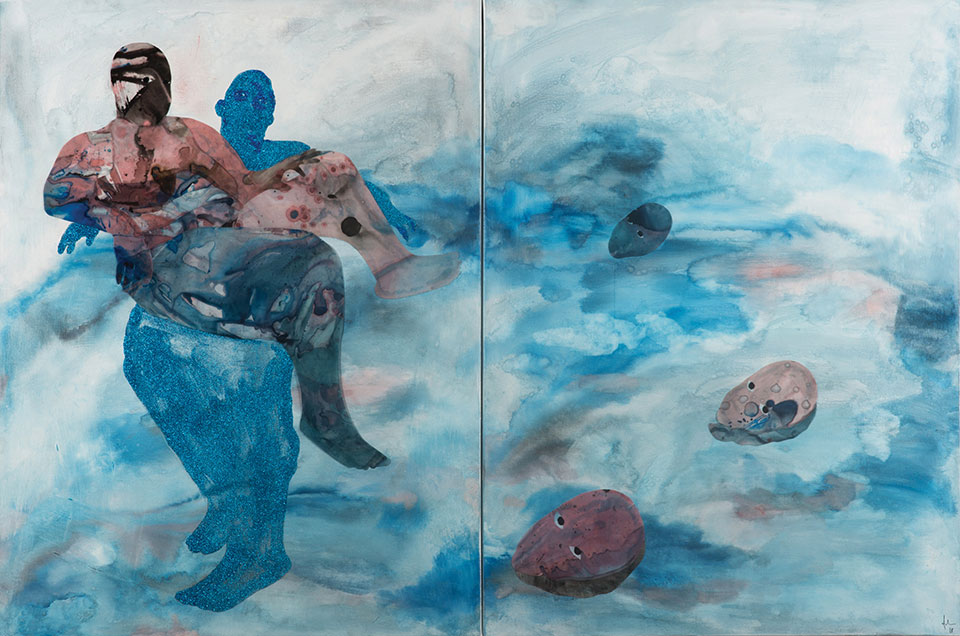Healing the Wounded: A Conversation with Artist Florine Démosthène

I first saw Florine Démosthène’s artwork Releasing the Truth, accompanying Anna Badkhen’s essay “Anatomy of Lostness,” while flipping through WLT’s November 2018 issue. It genuinely took my breath away.
I had the opportunity to sit down and speak with Florine about her inspirations and motivations while creating the series in which this painting appears, The Stories I Tell Myself, 2018. She described to me her time living in Ghana and spending countless hours preparing for a show that will pave the way for black female artists. 
The show had to be perfect. Although, in Florine’s eyes, perfect was an understatement. It had to leave people in awe. It had to make a statement.
Florine Démosthène had been working for countless hours and endured many sleepless nights to finish The Story I Tell Myself, her one-artist show before its opening in Gallery 1957 in Accra, Ghana. There was a strict deadline for the art gallery opening; however, everything that could have gone wrong had happened.
Florine was having difficulty finding studio space and tackled many issues retrieving supplies to the point where she would lose her temper, which rarely happens. As opening day quickly approached, her stress levels reached an all-time high until she was finally able to take a breath when she finished her last work of art.
Even though I had been living in Ghana, I’m not even going to front: it was a boys’ club.
There was a lot of pressure for the show to be perfect. Florine had been living in Ghana for three years, and this was her first show in Ghana. She saw this opportunity as a pivotal moment in her professional career. There were barely any well-known female artists in Ghana, and she wanted to create a positive space to represent females as creative and respected artists. “Even though I had been living in Ghana, I’m not even going to front: it was a boys’ club.”
As the only and first female artist being showcased at the art gallery, she found herself concerned by the lack of recognition. Living in a man’s world meant little exposure to profound female artists. People would praise her artwork, but they would be left dumbfounded once they realized the artist behind the canvas was a woman.
This included her friends. She mentioned showing one of her good friends her latest piece from The Stories I Tell Myself, and he was left crying “big man tears.” He was not the first person to have such a strong, raw reaction. The deep emotional impact and uniqueness of her artwork left people assuming she was a man.
Florine’s artwork embodies the black female heroine narrative and her desire to understand the experiences and cultures of black people in different realms. She discovered social-justice issues ingrained within the culture and chose visual arts as a platform to address those wounds and begin healing from them.
She wanted a collective understanding of black people without the influence of American colonial history to suggest when the wounds first began to bleed. Many people are led to believe colonialism is the sole aggressor of these scars on innocent black skin. Slavery, however, was a form of consumerism among African tribes for hundreds of years prior to colonialism and westernization. Human morale seemed lost beneath the gain of wealth. For example, Florine was so intrigued by the idea of understanding the psychology of why generations of people would willingly sell their neighbors in exchange for whiskey and gunpowder. “It was just becoming more and more apparent to me that we were just wounded people; there’s a deep, almost spiritual wound that no one wants to address.”
Florine was searching for a deeper understanding of who people are beyond the white gaze on the black female body. She wanted to begin mending the wounds her people felt by first addressing the issues through visual art. Her art collections portray a deep fear of vulnerability, which leaves us questioning whether we have true control of our own identities.
January 2019










